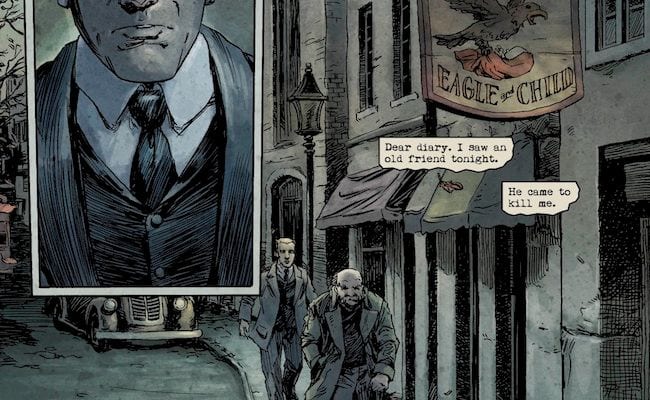Think back some two years ago to The Unwritten: On to Genesis, because that’s where this issue of Unwritten Apocalypse picks up in Wilson Taylor’s timeline. Wilson had just done some dirty work for the Unwritten Cabal in New York and more or less invented the comics industry’s business model. He’d just barely ducked out from being tracked by the Cabal’s vicious hitman, Pullman (vicious, ostensible hitman, because in a few short chapters Pullman will be revealed as the secret director of Cabal’s activities).
Now, Wilson resurfaces in wartime England, and as a friend and confidant of the Inklings, the famous literary group that included JRR Tolkien and CS Lewis and Dorothy Sayers. But it would be The Unwritten if the story ended there.

What makes this story so completely exceptional (exceptional, or expected? The Unwritten has played these games of literary allusion since its inception, and the quality of its brinkmanship has only grown over the years), is how creators Mike Carey and Peter Gross leverage the literary politics of the era to expand on Wilson Taylor’s story.
More than just a group interested in perfecting the art of telling a fine tale, the Inklings were deeply involved in the philosophical aspects storytelling, among these investigations into mythopoetics and mythography—the politics of story making as much as storytelling.
Take as example, Tolkien’s work with philology, more or less a practice of literary archaeology; the study of the way texts summon up prior linguistic forms or cultural ideation transmitted from earlier civilizations. Understand Tolkien’s ardent championing of philology, and it’s easy to understand how The Hobbit becomes his most sublime work—a grand geopolitical tale set in a fantasy world, told in the form a children’s tale. And it becomes even easier to understand why Tolkien sought to return to The Hobbit and rewrite it with all the weight and circumstance he wrote into The Lord of the Rings.
It’s exactly these rarefied notions Gross and Carey use to animate Wilson Taylor’s quest to both survive, and leverage control of stories back from the Unwritten. But even that’s only half the tale.
The other half goes around the 60 or so years prior to the Inklings, when Nietzsche himself waded into the murky waters of the politics of literary criticism. Nietzsche posed the idea that all art is a war between the Apollonian (the necessary illusions we grant ourselves to make sense of the world, like, in literature there must be characters, plot, drama) and the Dionysian (the unbridled, id-raging, chaotic mass of pure existence). Nietzsche felt that there can be no art without this opposition. And, moreover with the popularization of the reasoned thinking of the Socratic Method, art ultimately lost its power to enlighten humankind. But, in an unexpected turn, the age of Modernity might actually bode a return of the inherent opposition.
Pay careful enough attention, the power of both the Inklings, and the world left in the wake of Nietzsche’s championing of literary criticism become vibrant threads in the drama of Unwritten Apocalypse. But even that is not enough. Think of the drama you can bring for yourself. For me, that comes in the form of Metallica’s sublime Garage, Inc. album, the most philological of metal albums. An album wherein classic rock tracks like Bob Seger’s “Turn the Page” or Euro folk tunes like “Whiskey in a Jar” are subjected to a heavy metal treatment.
Please enjoy our exclusive preview of Unwritten Apocalypse #9, “Inklings.”


![Call for Papers: All Things Reconsidered [MUSIC] May-August 2024](https://www.popmatters.com/wp-content/uploads/2024/04/all-things-reconsidered-call-music-may-2024-720x380.jpg)



